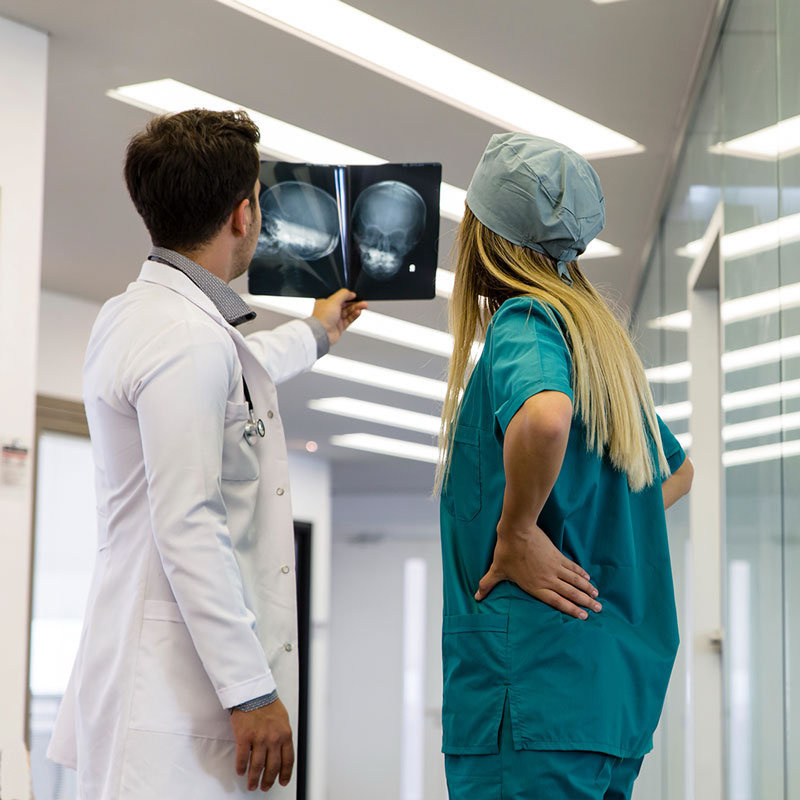What Are Nasal Tumors?
A nasal tumor is an abnormal growth of tissue in the nose. Most nasal tumors are non-cancerous. Nasal tumors are rare and typically seen in people who are in their 40s or older.
At University of Utah Health, our fellowship-trained rhinologists are ear, nose, and throat specialists who have advanced training in nasal and sinus conditions. They provide expert care, including extensive evaluations and personalized treatment plans based on the patient’s exact nasal tumor type. This is essential to achieve the best possible outcome.
As an academic medical center, U of U Health offers clinical research trials that focus on nasal tumors. Patients who participate in these studies can help researchers explore new treatment options for people with these conditions.
Types of Nasal Tumors
Most nasal tumors are not cancerous. Some of the more common non-cancerous nasal tumors include:
- inverted papilloma and
- juvenile nasopharyngeal angiofibroma.
Some of the more common cancerous nasal tumors include:
- esthesioneuroblastoma (sometimes called olfactory neuroblastoma),
- squamous cell carcinoma, and
- adenocarcinoma.
These tumors can occur in the nose or the sinuses, the hollow spaces located in the skull that connect to the nasal passages. Tumors that occur in the sinuses around the nose are called paranasal tumors.
Find a Rhinologist
Nasal Tumor Causes
Tumors form when abnormal cells grow and multiply out of control. Experts don’t know why some people develop nasal tumors and others don’t. Some risk factors include:
- smoking and being around other people who smoke;
- long-term exposure to chemicals and irritants at work, such as wood dust, fumes from glue, and formaldehyde; and
- infection with human papillomavirus (HPV), a common sexually transmitted disease.
Nasal Tumor Symptoms
Common symptoms for people with a nasal tumor include:
- difficulty breathing through your nose (especially if it’s one-sided);
- double vision;
- facial pain, pressure, or swelling (especially if it’s one-sided);
- frequent nosebleeds;
- loss of sense of smell;
- a runny nose; and
If these symptoms persist, it’s a good idea to see a specialist, such as a rhinologist. You do not need a physician referral to see a rhinologist at U of U Health.
What to Expect at Your First Appointment


Nasal tumors can cause the same symptoms as many other nasal and sinus conditions. The goal of your first appointment is for the doctor to establish an accurate diagnosis and develop a personalized treatment plan. During this appointment the doctor will:
Treatment Plans for Nasal Tumors
The rhinologist will discuss an initial treatment plan with you during your first appointment. He or she will then discuss your care with colleagues in radiology, pathology, medical oncology, or radiation oncology, if appropriate. This can help develop an optimal treatment plan for you.
Before finalizing your treatment plan, you may need to go through additional steps, such as:
- having a biopsy taken of the growth so that it can be tested in a lab (the biopsy may happen in the clinic or operating room depending on the location of the tumor);
- imaging tests, such as computed tomography (CT) or magnetic resonance imaging (MRI);
- clinic appointments with other tumor specialists who may be involved in your care, such as neurosurgeons, oncologists, and radiation oncologists.
The rhinologist will talk to you about your biopsy and imaging results and the treatment recommendations for your specific tumor. This discussion can happen on the phone or during a follow-up appointment.
Nasal Tumor Surgery
 The majority of people with a nasal tumor need surgery to remove it.
The majority of people with a nasal tumor need surgery to remove it.
If the tumor is cancerous, you may receive care from other cancer specialists as well, such as oncologists or radiation oncologists. Your treatment plan will include surgery and possibly radiation therapy, either by themselves or with chemotherapy. The rhinologist will work with other cancer specialists to select the best treatment plan for your tumor type, location, and extent of growth.
Endoscopic surgery to remove nasal tumors
The majority of surgeries to remove a nasal tumor can be done with a minimally invasive approach. During this surgery, the surgeon will access your nasal passages using endoscopes inserted into your nose. Endoscopic surgery does not require external incisions or the removal of any skull bone. Patients usually heal faster, experience less pain, and get out of the hospital sooner than those who have open surgery.
Open surgery to remove nasal tumors
If a tumor is very large or has grown into your brain or eye tissues, the rhinologist may decide to do an open surgery. This can involve making incisions alongside the nose, under the lip, or near the eye to access the tumor and remove as much of it as possible.
In some cases, the open surgery involves a craniotomy, which is a brain surgery where part of the skull is removed temporarily so that the surgeon can access the tumor.
During these complex surgeries, the rhinologist will work with other types of surgeons at U of U Health, such as a neurosurgeon who specializes in skull base surgeries. The surgical team may even do a combination of endoscopic and open procedures. This type of care is only available from the highly specialized teams at U of U Health.
Depending on how complex your surgery is, you may be able to go home as early as the same day. Some people will need to stay at the hospital for a few nights, including spending some time in the intensive care unit (ICU). Your care team will let you know what to expect and how to prepare.
You’ll have a follow-up appointment with your rhinologist about a week after the surgery. The doctor will view your sinuses using an endoscope to make sure everything is healing well. You’ll probably be able to resume your normal activities over the next few weeks.
Follow-Up Treatment for People with Cancer
If your nasal tumor is cancerous, you will follow up with the rhinologist and members of the cancer team. These specialists will work together to make sure you receive well-coordinated care. After you complete your initial treatment of surgery and possibly radiation therapy and chemotherapy, you’ll have more tests to see if treatment was successful. You will have follow-up visits over the next five years or so to make sure the tumor hasn’t returned.
Non-cancerous nasal tumors can grow back, too. The rhinologist will talk to you about having follow-up visits and imaging tests for the next few years, just to be safe.
Making an Appointment with a Rhinologist
Referrals are welcome but not necessary when making an appointment with a rhinologist at U of U Health. To make an appointment, call 801-587-8368 or use our online form. Our team will verify your insurance coverage before your visit. If you have had medical tests related to your condition, we will request the results from your provider. Our goal is to make your visit as efficient and helpful as possible.
